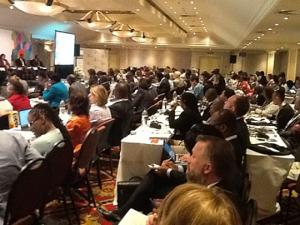African Public Health Leaders Unite to End Preventable Deaths and Improve Health of Women, Children and Adolescents by 2030
Regional Stakeholders Convene to Shape Global Strategy for Women’s, Children’s, and Adolescents’ Health
| Johannesburg, 6 May 2015 - Hundreds of leaders and public health experts from across Africa are gathering today to identify game-changing interventions to accelerate progress towards improving the lives of millions of women, children and adolescents. This consultation will provide a roadmap – an updated Global Strategy for Women’s, Children’s, and Adolescents’ Health – to end preventable deaths of women, newborns, children and adolescents by 2030, which will be launched alongside the new Sustainable Development Goals (SDGs) in September. This revised strategy will build on the Global Strategy for Women’s and Children’s Health, launched in 2010 by the United Nations (UN) Secretary-General.
“Over the last two decades, the world has made unprecedented progress in advancing women’s and children’s health. In 2013, 6.4 million fewer children died than in 1990, and in this same time frame, deaths of women during pregnancy and childbirth were cut by almost half,” said Graça Machel, Chair of the Partnership for Maternal, Newborn & Child Health (PMNCH). “African leaders have been at the forefront of these efforts, as demonstrated by the Campaign on Accelerated Reduction of Maternal, Newborn and Child Mortality in Africa and the many commitments made to the original Global Strategy.”
Despite immense progress, the scale of the problem remains vast: As of 2013, 17,000 children under the age of five still die every day. Moreover, approximately 225 million women who want to prevent or delay pregnancy are not using modern contraceptives and each hour, 33 women die from preventable causes related to pregnancy and childbirth. Over half of maternal deaths occur in sub-Saharan Africa alone. To reach the global goals for women’s and children’s health by 2030, it is estimated that an additional US$5.24 is needed per person per year. Calls for increased funding stress the need for investments to be predictable and sustainable, as well as increasingly efficient.
“Healthy women and children are the bedrock of stable, productive societies,” said Dr. Aaron Motsoaledi, the Minister of Health of the Republic of South Africa. “Ensuring the health of every woman, child and adolescent will only become more urgent as the next generation grows. We are already grappling with the largest population of young people in history, and it is projected that in 35 years, Africa will be home to over a third of the world’s youth. Imagine if all of these young women and men could lead healthy lives and raise healthier families.”
This meeting – co-hosted by the South African National Department of Health and the UN Secretary-General’s Every Woman Every Child movement, with support from PMNCH and the World Health Organization (WHO) – is part of a broad consultative process to update the original Global Strategy. It will focus on new and targeted solutions to addressing societal and structural barriers to health, such as education, legal entitlements for women and children, and nutrition. Given demographic shifts in Africa, the consultation will have a large youth component.
Stakeholders will also discuss the importance of building resilient health systems, improving the quality of health services and attaining universal health coverage. Particular attention will be paid to vulnerable populations, such as newborns and adolescents, as well as those living in fragile states marked by conflict, displacement and natural disasters, where 60% of preventable maternal deaths and 53% of under-five deaths occur.
“Unified action, high-impact interventions and sufficient, targeted financing will help drive progress for women, children and adolescents over the next fifteen years,” said Amina Mohammed, the UN Secretary-General’s Special Adviser on Post-2015 Development Planning. “The updated Global Strategy can help us all work together effectively to ensure that every woman, child and adolescent in sub-Saharan Africa and across the globe survives, thrives and transforms their communities.”
Immediately following the consultation, the UN Secretary-General will host a high-level call to action on 14 May to mobilize commitments and leadership from countries around the world for the updated Global Strategy. The strategy will be discussed at the World Health Assembly on 18 May and then officially launched by the UN Secretary-General in September 2015 alongside the SDGs. It will be accompanied by a five-year implementation plan that can be tailored to meet country-specific needs and contexts.
____________________________
Every Woman Every Child
Every Woman Every Child is an unprecedented global movement that mobilizes and intensifies international and national action by governments, multilaterals, the private sector and civil society to address the major health challenges facing women and children.
Government of South Africa
The Government of South Africa recognises that success in achieving better health outcomes as a country depends on partners' collective ability to build relationships and work across sectors. It is highly committed to improving the lives of women and children, and the reduction of maternal and child mortality remains a critical focus area for South Africa. In 2012, South Africa launched the Campaign on the Accelerated Reduction of Maternal and Child Mortality in Africa (CARMMA) strategy, setting goals to reduce maternal and neonatal mortality by more than half between 2013/2014 and 2018/19.
Partnership for Maternal, Newborn & Child Health
The Partnership for Maternal, Newborn & Child Health (PMNCH) is a partnership of 680 organizations from across seven constituencies: partner countries, multilateral organizations, non-governmental organizations, the private sector, professional healthcare associations, academic, research and training institutions, and private donors and foundations. Hosted by the World Health Organization and launched in 2005, the vision of the Partnership is the achievement of the Millennium Development Goals, with women and children enabled to realize their right to the highest attainable standard of health in the years to 2015 and beyond.
____________________________
For more information please contact:
Stephanie Platis
Tel: +27 764278814



